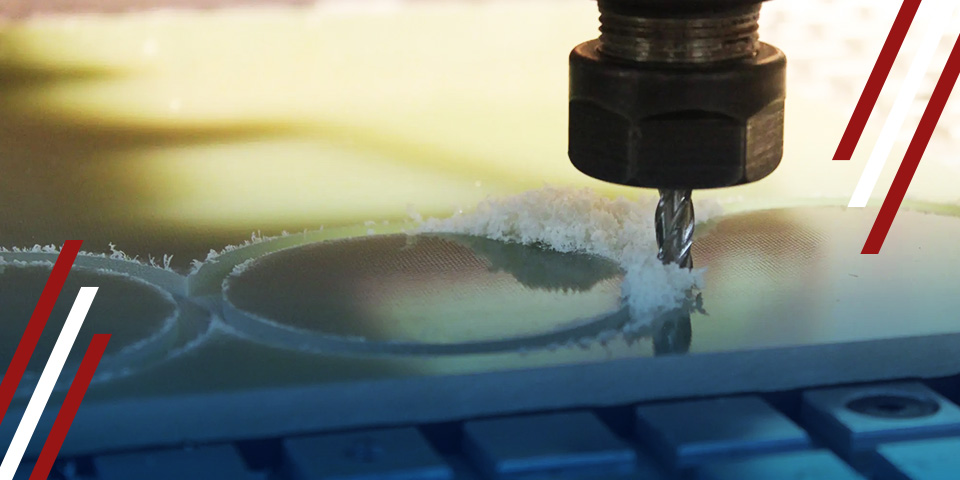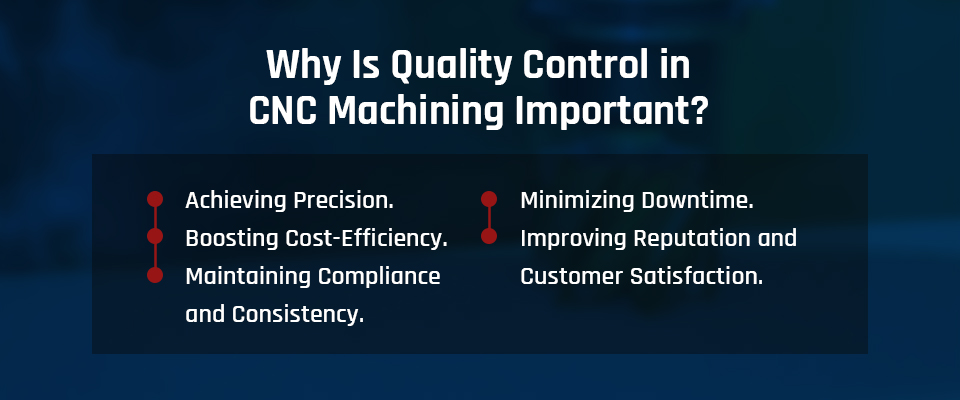

Quality control is an essential part of any manufacturing process. CNC machining offers several benefits compared to traditional manufacturing, such as improved productivity, but it still requires quality control procedures to maintain high-quality products.
You can keep your standards high when you carry out CNC machining inspection techniques at different stages of the machining process. Your customers expect a specific standard and have requirements for their products — upholding quality in CNC machining will ensure your products match their specifications, strengthening customer relationships.
Quality control ensures products meet specific quality standards. Quality control in CNC machining ensures high-quality products for your customers and increases efficiency and reduces costs for your business. A lack of quality control can have adverse implications — when you produce poor-quality products, it harms your relationship with customers and your reputation.
It’s important to note that CNC machining quality assurance differs from quality control. Quality assurance refers to the processes set by your company and a relevant authorized body to carry out quality inspections. It also includes setting up documentation of quality standards.
Maintaining quality in CNC machining has several benefits for your business. Consider the following elements of quality control procedures in CNC machining.

Precision in CNC machining is the ability to produce parts with accuracy and consistency. It ensures parts meet the correct specifications and function properly. To achieve precision, you must control the cutting tools, workpieces and machine components to achieve the right surface finish, dimensions and tolerances.
The programming you use for the CNC machine must precisely control the movement of the cutting tools, ensuring they move along the correct paths and cut the right amount of material to achieve the desired finish. The part must be manufactured to the precise specifications to ensure it fits properly. If it is too big or too small, it may not fit and cause problems in the assembly.
Even small deviations from the specifications can cause problems and affect the quality of the finished product. If a product has a specific requirement, precision helps you achieve the desired finish. Deviations from the specifications, no matter how small, can result in a finished product that doesn’t perform its intended task. These deviations can result in safety hazards, product failures and expensive recalls.
Ensuring precision in CNC machining helps minimize these risks and maintain a high-quality product.
Quality control helps reduce costs by decreasing the amount of material waste. Material is a significant expense in CNC machining, so it’s essential to use it cost-effectively and wisely. You must choose a material that best suits the specification requirements and the product’s design. Avoid overspecifying the material or oversizing it to avoid wasting material.
Cut back and minimize material wastage by using standard sizes, nesting your parts or reusing scraps. You can also reduce wastage and use materials more efficiently with near-net shape blanks or through processes such as forging or casting before machining.
Quality control ensures you consistently produce a high-quality product across different batches. If you’re inconsistent, your product quality will constantly fluctuate, yielding different results each time. Failure to comply with industry standards can be costly for your business — doing so affects the product’s quality and increases demand for products with low supply.
Implement strict quality control processes by carrying out checks before, during and after the production process. Consistency and compliance are both essential factors in maintaining a reliable supply chain and meeting customer demands.
There are two types of downtime — planned and unplanned. Planned downtime is when you plan for the machine to be down during operation hours for maintenance. Unplanned downtime is when your machine unexpectedly and inconveniently stops working. Downtime can be very expensive for your business, lowering the efficiency and product output.
Emergency repairs on a machine can also be more costly than routine maintenance. Unplanned downtime is also a safety concern. If a faulty machine breaks down, it can injure an employee. Unplanned downtime brings your operations to a stop, lengthening lead times and affecting your ability to deliver to your clients.
With stringent quality control, you can track machine performance and determine when a machine needs maintenance. Regular maintenance ensures it works as it should, reducing and preventing unplanned downtime. When you can predict when your machine needs maintenance, you can minimize production disruptions.
A proper quality control process will give you the ability to:
Downtime will inevitably occur, but having a quality control process can minimize the amount of unplanned downtime you experience.
Meeting client specifications is an important part of quality control. Your customers have requirements for their products. When you adopt quality assurance techniques, you help ensure products are consistent with these requirements. Quality control decreases the chances of a defective product — because of this, customers will see the value of your services.
A quality control process can also help you pick up on problems early in the production process. You can flag these with customers sooner rather than later, letting them know there will be a delay in delivery. When you consistently meet your customers’ requirements, it creates a positive reputation for your company.
Quality control in CNC machining ensures you consistently produce high-quality products. As a result, you can also minimize downtime and reduce the costs associated with material wastage. Your customers rely on you to produce high-quality products according to their specifications. Strict quality control helps you meet their demands, delivering quality products that help to boost your reputation.
At American Micro Industries, we offer custom CNC machining services and parts. We have the supplies and expertise to provide you with custom CNC machining services or supply you with the parts you need to complete your next CNC machine project. Are you ready to get started? Learn more about our CNC machining services today.